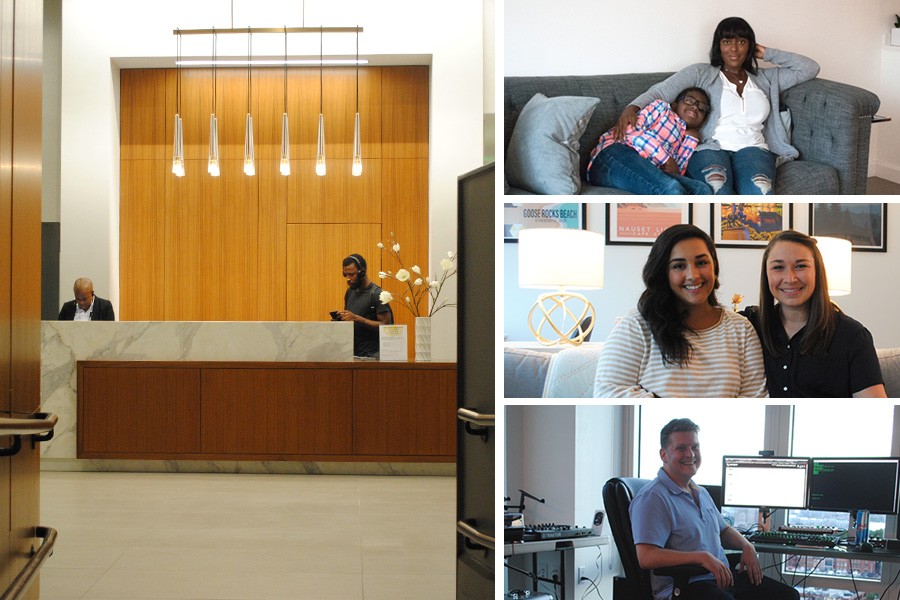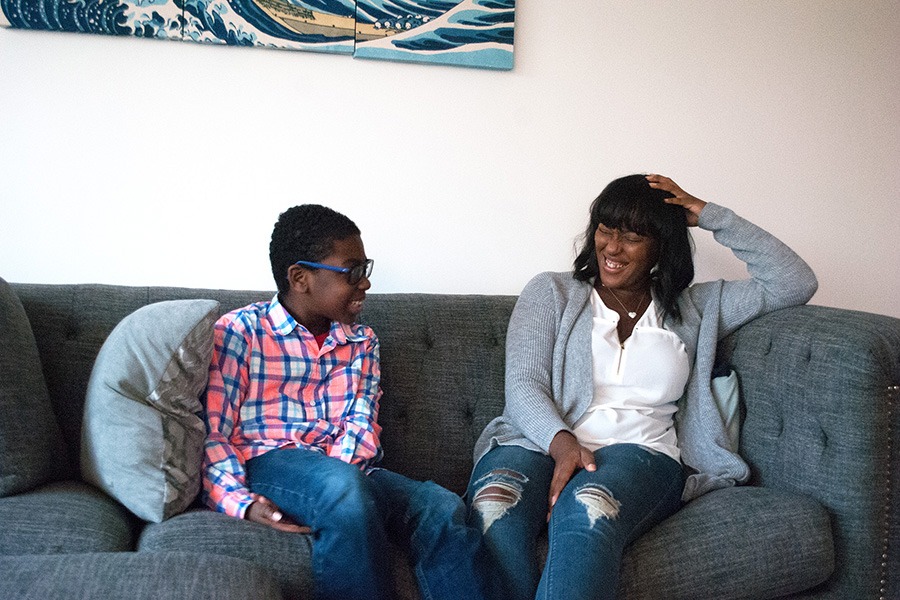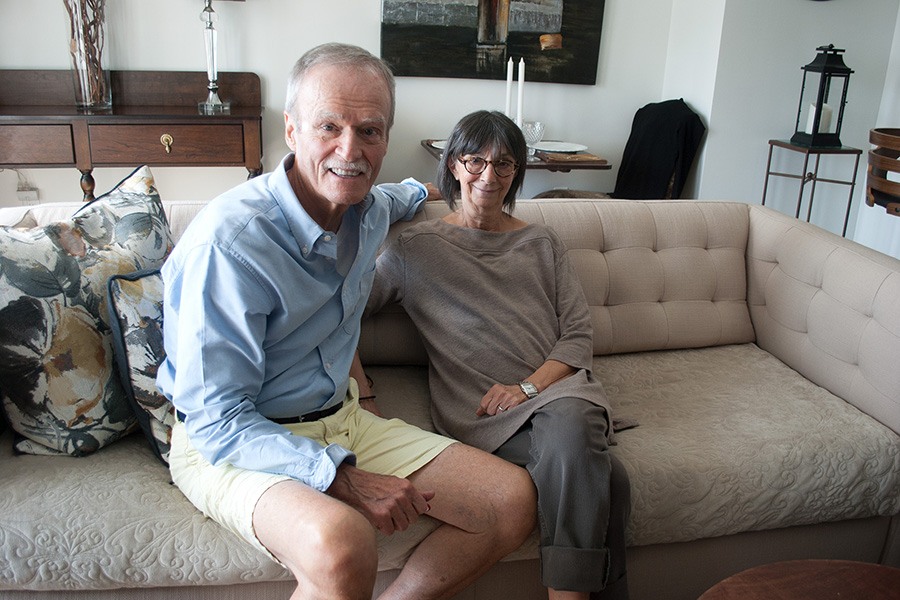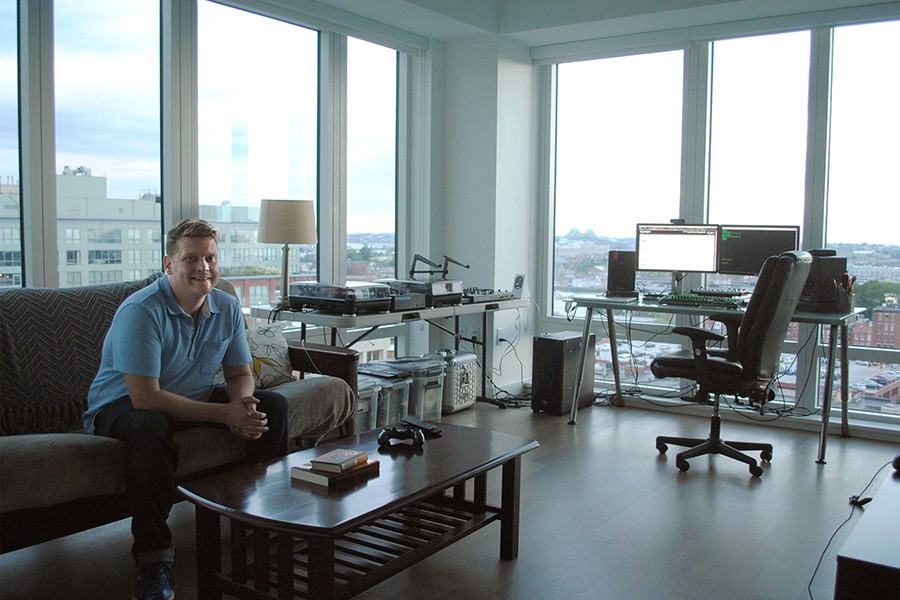Meet the People Who Won One of Boston’s Most Competitive Housing Lotteries
Remember the Beverly—the apartment complex billed last year as “workforce housing”? Here’s who’s lucky enough to live there.

Photos by Madeline Bilis
When a new apartment building springs up in Boston, there’s a good chance you don’t even bat an eye. After all, most of us can’t afford to live in them—the city’s building boom simply isn’t geared toward the middle class.
So it was rare last summer when a housing development reserved specially for middle earners was announced, becoming Boston’s first completely income-restricted residential complex in 25 years. When a call for applications was put out, middle-class Bostonians collectively gasped—and furiously began filling out the necessary paperwork. The building, called the Beverly, suddenly became the hottest ticket in town.
More than 6,000 applications poured in for 239 units, 191 of which real estate firm Related Beal dubbed “workforce housing.” That meant anyone looking to move in had to earn between $64,650 and $198,000 per year, or in other words, between 110 and 165 percent of the annual median income. (The other 48 units qualified as affordable housing and were open to those with annual incomes ranging from $17,578 to $60,000.)
Leasing agents combed through the applications, first ensuring renters met those income restrictions, and then sorting through a range of secondary factors to assign lottery numbers. The selection process gave preference to applicants such as families, people with disabilities, and people already living in Boston, so as not to push those groups out of the neighborhood. Then, eligible applicants received a lottery number and waited.
When a lucky few got the call that they’d been accepted, they had to decide if it was all worth the price tag. The Beverly’s rent prices vary based on renters’ incomes, so a household earning between $69,145 and $79,640, for example, would pay $2,061 for a one-bedroom.For some, that isn’t exactly what comes to mind as a reasonable rent payment. But for others, it’s a small price to pay for a pet-friendly building with skyline views, a fitness center, a 24-hour lobby, an entertainment room, a children’s room, and an outdoor terrace with grills.
Rent Ranges for “Workforce” Units at the Beverly
Studios
$1,937 to $2,932
One-bedrooms
$2,061 to $3,127
Two-bedrooms
$2,469 to $3,748
Three-bedrooms
$2,848 to $4,326
The folks who beat the odds and scored apartments in the Beverly include college graduates, a married couple in their 70s, a mother and her son, and a bachelor working at Wayfair. Ahead, meet some of the residents of the city’s landmark new workforce housing development.
→ The Recent Grads
→ The Mom
→ The Baby Boomers
→ The Bachelor

Natalie and Caroline / Photo by Madeline Bilis
THE RECENT GRADS
Natalie Sanchez and Caroline Cormier
Ages: 24
Occupations: Global inclusion & diversity officer at State Street Corporation, engagement strategist at Allen & Gerritsen
Unit size: One-bedroom
“What do we have to lose?” was the shared mindset of Natalie Sanchez and her girlfriend Caroline Cormier when they decided to apply to live in the Beverly last fall. They’d graduated from Holy Cross in 2016 and did what every recent grad dreams of: landing jobs in Boston right out of college. Figuring out how to afford living in the city could be dealt with later. The couple lived with their parents in Nashua, N.H., and Andover, Mass., for almost nine months, making a two-hour trek twice a day. Their lives marginally improved when they moved into a high-priced shoebox in the North End—but even then, income-based living at the Beverly seemed light years away. They gave it a go anyway, filling out pages and pages of paperwork and standing in line for a lottery number.
After months of radio silence, the couple figured they’d missed their shot. They jetted off to work conferences, then enjoyed a much-needed vacation. It was upon their return that they found a days-old letter in their mailbox: They’d been accepted. A unit with air conditioning, laundry, new kitchen appliances—all previous unheard of amenities would soon be theirs.
“We thought we were going to have to go from kind-of bad apartment to bad apartment until we got farther along in our careers,” Cormier says.
The upgrades had Sanchez and Cormier blinking in disbelief. While their last apartment lacked enough space for seating, their new unit allows them to invite over multiple guests who all fit inside with room to spare. They sing the praises of the building’s common area, complete with a roof deck overlooking the city.
“At any point as a young professional, you’re sort of compromising on something. If you’re working in the city you have a bad commute, but you might be living in a house. If you’re here, you’re probably living in a tiny apartment but you’re close to your friends and work,” says Cormier. “In a place like [the Beverly] we’re ultimately able to not compromise on a lot of things our friends have to.”
Moving into the city gave the couple their lives back, says Sanchez, so much so that they marveled at the abundant free time they had to fill.
“We’re not in a position to be able to afford this square footage, these amenities, or this type of new building anywhere else. Not just in Boston, but in any major city,” says Sanchez. “Looking at [nearby developments] like Lovejoy Wharf or One Canal—they’re thousands of dollars more than this.”
Luxury buildings automatically exclude a significant portion of renters, explains Sanchez. But the Beverly allows her to enjoy the benefits of a luxury complex, minus the luxury price tag.
“There are a lot of times when you’re living in the city where you’re schlepping stuff back home, you get upstairs, and there’s no air conditioning. And you’re like ‘Is this worth it?’ says Cormier. “I don’t feel like that here.”

Gregory and Tammy / Photo by Madeline Bilis
THE MOM
Tammy Brown and her son, Gregory
Occupation: Medical audit retriever
Unit size: Two-bedroom
For Tammy Brown, a quick Google search for apartments in Boston brought her to the Beverly’s website. After living in Dorchester with her mother, she set out to find her own space, and the Beverly appeared to be a perfect fit. She applied on a whim and was accepted. “It was all timing. It was chance,” she says.
Now, from her two-bedroom unit on the ninth floor, Brown overlooks downtown instead of a quiet residential street near Codman Square.
“I feel like Rapunzel. It’s a good view,” she says.
Her son Gregory likes it, too.
“The coolest thing about living here is you get a high view. You can see the Boston Public Market from here. You can see all the cars driving by,” says the 10-year-old. “And we’re near the T station, so we just have to walk right across the street and then get on the train.”
When Tammy and Gregory moved into the Beverly in March, Gregory transferred to the Eliot School, a Boston Public Innovation School that’s a few minutes’ walk from the Beverly’s front door.
The ability to walk Gregory to school, and then quickly get to her office downtown, was the biggest draw for Tammy. The proximity to Umberto—where she used to grab slices of pizza as a kid—doesn’t hurt, either.
“Traditionally places like this were only accessible by people who could pay a lot of money,” Brown says. “…and I think that people who have been given the opportunity (to live here) should take pride in that, and do.”
Brown says a building like the Beverly represents where Boston needs to grow to stay as a world-class city. “You have to line your ducks up and be like, okay, look, we got this medicine thing down, we got this education thing down, we have to get this housing thing down,” she says. “We have to build this foundation where we want to move up from. We have to be an example to other cities, because it has to start somewhere.”

Paul and Dorothy / Photo by Madeline Bilis
THE BABY BOOMERS
Paul and Dorothy Rivers
Occupations: Part-time professor at Bunker Hill Community College and retired special education paraprofessional
Unit size: Two-bedroom
Paul and Dorothy Rivers stood in the pouring rain for a lottery ticket. They were getting desperate, explains 71-year-old Dorothy. The rent in their Commercial Street apartment kept dramatically increasing each year and they simply couldn’t swing it anymore.
“We were getting to the point that we didn’t know where we were going to go because we couldn’t find anything. And we didn’t want to leave the city,” Dorothy says.
The Rivers were one of the first 3,000 people in line for a ticket.
“They told us there were 230 apartments and that roughly 6,000 people had expressed interest. When you run through the numbers, we weren’t optimistic about it,” says Paul.
So when they heard they’d made it in, Dorothy says she “died and went to heaven.” “It was unbelievable,” she says.
Though the couple never imagined they’d live in a high-rise near North Station in their lifetimes, they moved into their apartment this May.
“You’d see [these buildings] but it was always for someone else,” says Paul. “You never really thought it was possible.”
Dorothy, who hails from Dorchester, said she would go to Boston Common as a little girl and always dreamed of living in Beacon Hill. This, she says, is the next best thing. Its location means Paul can zip over to teach class at Bunker Hill Community College in Charlestown, while its rentable common spaces will allow the Rivers to host a good old-fashioned Christmas party this year.
“It was always the unknown that bothered us,” says Paul of life before the Beverly. To know that their rent isn’t going to be increased annually gives them peace of mind. “If anything were to happen to me, to not have Dorothy be in a place where she’s not going to able to afford it and have to begin this hunt all over again—you sleep well, that’s the best way to put it.”

Michael / Photo by Madeline Bilis
THE BACHELOR
Michael McGowan
Occupation: Networks engineer at Wayfair
Unit size: One-bedroom
Late last year, Michael McGowan made a decision: 2018 would be his year. As a bachelor living in Framingham, he was watching his friends get married, have kids, and move to the suburbs. He decided to do the opposite: get a job in the city, and hopefully find a halfway decent apartment there, too. The job came first—he landed a dream position of being a network engineer at Wayfair. His goals were off to a roaring start, minus the commute back and forth from his Framingham apartment complex. He figured he’d deal with housing later, once he figured out which neighborhood he could afford to live in—if there were any.
Then, he got a phone call about a call about a housing lottery he’d entered months earlier. He’d been accepted into the Beverly, and in a matter of weeks, he was living in one of the swankiest bachelor pads in the city. His one-bedroom unit offers unparalleled views of the harbor.
“Ten or 20 years ago, I never would have imagined I’d be here doing what I do, waking up to that view,” he says.
McGowan was born in Boston, and lived in foster care until he was 10 years old. He was shuffled from Somerville to Southie, and then settled in Brockton. When he turned 18, he moved back to Southie for a time, and then to Somerville. But even in his youth, he’d never lived so close to downtown.
“I try to be a humble, grateful person because I was raised that way. I was raised as a little Irish Catholic boy, so I think I had a preexisting guilt condition,” he jokes. “I would say there was a good two months where it was almost like a honeymoon phase. I felt like I was in a hotel on vacation. And then I was like ‘Okay, I actually have to live, get a routine, function. This is a lifestyle change, so time to lifestyle it.’”
McGowan explains that Southie, Somerville, and other neighborhoods are almost unrecognizable to the ones he knew as a kid. Though development can “help the city shine,” he says a downside of new money streaming in is that the people who define Boston get pushed out. The Beverly does the opposite of that, he says, eschewing a VIP club-like atmosphere for a diverse mix of residents.
“Even if I didn’t end up living here in this great apartment, I’d still be an advocate for initiatives like this because I really think it’s important that people like myself, and other people born in Boston people who grew up around here, can have the opportunity to live and work in Boston,” he says. “I like to think of us as the character of the city. For us to be able to have a community to exist here without being bought out. I think that’s something that’s really relevant.”


